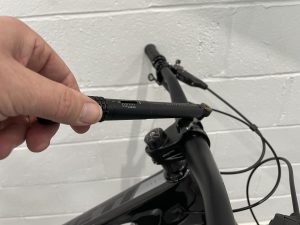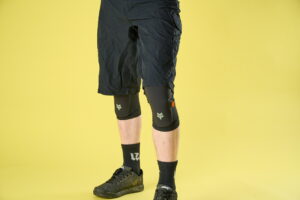This bike relishes the fast flowing terrain where other e-bikes flounder. You can ride it beyond its limits and that of the motor, so it will take you places other e-bikes refuse to go
Canyon Neuron:ON 7.0 review
Following in the footsteps of the Spectral:ON, their first full-suspension e-bike, the new Canyon Neuron:ON shares a similar design philosophy.
>>> Best electric mountain bikes in 2019
All models use alloy frames, all come with external batteries, and the geometry and travel closely mirror the analogue version of the bike.
Once again, Canyon has partnered with Shimano to provide the pedal assistance, where all three models come with a Shimano STEPs E8000 motors and 502Wh batteries.
So even if you buy the entry-level Neuron:ON 5.0 at £2,999, it has the exact same alloy chassis, motor and battery as the top end Neuron:ON 7.0 tested here. A chassis that’s built around fast rolling 29in wheels and delivers 130mm of travel.
Geometry wise, we’ve already mentioned that the ON version mirrors the regular Canyon Neuron, and by close we mean the only real differences are that the top-tube length is 5mm longer on the e-bike, the seat angle is 0.5 degrees slacker, and the BB height is elevated by 8mm for extra pedal clearance. Other than these subtle differences, the geometry, fit and sizing are almost identical.
Suspension
Like all of Canyon’s modern suspension bikes the Neuron:ON employs a progressive three phase linkage that offers good small bump sensitivity for grip, ample mid-stroke support for stability, then ramps up in the final third of travel to resist bottoming. It’s an effective 4-bar design that has translated well to Canyon’s e-bike platforms.
Matching travel front and rear is the 130mm Fox 34 Performance series suspension fork. It supple off the top, so grip is first rate even with the harder compound tyres that we’ll get to in a minute. It’s worth experimenting with volume spacers though, as adding some progression to the fork will give a better balance front to rear without having to run the fork harder.
Components
With a 455mm reach measurement the size L Canyon isn’t super long, so the 60mm Race Face stem helps open up the cockpit and load the front end without the steering feeling sluggish. We’d like wider handlebars than the 760mm that comes stock though, because the extra leverage makes it easier to muscle a 22kg bike around on the trail.
Our test bike came with a cumbersome Di2 remote for the display, which forced Canyon to fit a over-bar remote for the 150mm Fox Transfer dropper post. Thankfully, Canyon has since switched to the new E7000 compact Control Switch used on the Vitus E-Sommet.
The Canyon SD:ON saddle deserves a special mention as its whale-tail design gives you something to push against on the steepest climbs. It’s such a good design we can’t understand why it doesn’t come stock on all of Canyon’s full-suspension bikes.
Performance
Now, normally we’re not big fans of harder compound tyres, but the 2.6in Schwalbe Hans Dampf/Nobby Nic combo on the Neuron:ON brings something we weren’t expecting to the e-bike experience… speed. So whether it’s rolling along a relatively flat section of singletrack or just hammering along blacktop to get to the trailhead, the Neuron:ON is incredibly fast and holds speed better than any other e-bike we’ve tested. So if your typical trail ride doesn’t consist of fire road climbs followed by downhill tracks this is the bike for you.
Also, because the Shimano E8000 motor has very little resistance when you exceed the 15.5mph (25km/h) assist limit, it’s the first e-bike that we have been prepared to push above and beyond that limit, as it didn’t feel like a total wastes of energy to do so.
Best of all, you can still rail the descents. The Canyon Neuron:ON is way more stable and surefooted than a non e-bike with the same angles, travel and specification. In fact, with the pedal assistance to overcome the additional weight on the climbs, the extra mass in the frame is a bonus to the handling as it makes the suspension that much more effective, so even the hard compound tyres won’t hold you back on the fun stuff.
Just be sure to keep an eye on the Quixle rear axle though, as we found that it tends to unwind by a ¼ turn by the end of every ride.
















